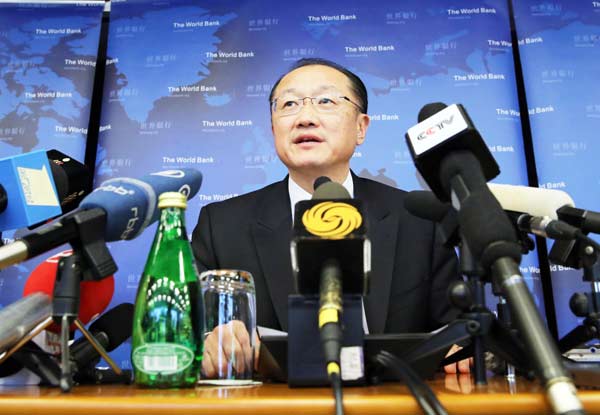Q+A | Jim Yong Kim
Editor's Note: Jim Yong Kim stayed in Beijing and Sichuan province during his four-day visit, going to four reconstruction sites in Sichuan and visiting small counties such as Yanting. The following is the transcript of China Daily's interview with Kim during his visit to the southwestern province.
|
 |
|
World Bank President Jim Yong Kim answers questions at a news briefing on Friday, the last day of his visit to Beijing. Wu Zhiyi / China Daily |
Q: What has been your impression of your visit to China so far?
A: You know as a Korean, I always feel a great closeness to China and people in Sichuan, because we both eat spicy food, right? I am a physician and an anthropologist, and I study Chinese medicine. I am very happy to be here in this place that I have known about for so long.
I wasn't quite sure what to expect when coming to Sichuan, and we all remember the devastation of the earthquake. To see how much it has been rebuilt is very inspiring.
I went to the maternity and children's hospital of Yanting county, Mianyang city. I was so impressed. Because I am a physician, I know what to look for. The quality of the facilities and the services and care the patients are getting greatly impressed me.
This is a tremendous accomplishment that the World Bank has participated in, and it's really a testament to the government of Sichuan. It's a story I will take with me now into the rest of my job. You know I was just in Haiti where another huge earthquake happened, and Haiti was in a worse situation. It can learn from what has happened in Sichuan.
How many times have you been to China, and what has impressed you most?
This is my third trip to China, and each time I come back, I am even more encouraged by what I see. This is a country that is developing so rapidly.
There are so many people, and there are so many challenges, but it seems to me that the government and the private sector are stepping up to the enormous challenges. The scale of China and the scale of the efforts of the government and the private sector to respond to the needs of the people are very impressive.
The first time I was here was in 2005, in Beijing at the center for disease control, as a representative of the director-general of the World Health Organization, and I was the head of the HIV department. I was extremely impressed by China's active response to HIV.
The second time was just a few months ago when I was campaigning for this job. And the growth and development of the country in the past seven years has been really, really stunning.
Before I came to Sichuan I asked whether there were slums here. I was told slums are illegal, and everyone has a place to sleep. And that is itself a great accomplishment.
Would you like to come here more often?
As president of the World Bank, I will come here on a very regular basis. My guess is I will be here at least twice a year, as China is such an important country for the region and for the world, and especially for the World Bank Group.
You met Vice-Premier Li Keqiang, and talked about urbanization. Do you think that urbanization should be a priority for China to maintain sustainable growth?
I think there are many things to tackle, but the vice-premier had an extremely insightful view on urbanization. He said urbanization is about services, food security, healthcare, education and retirement.
He said that urbanization in a way was strategically about the overall development of the country. So I was very impressed by the way that he conceptualized urbanization.
